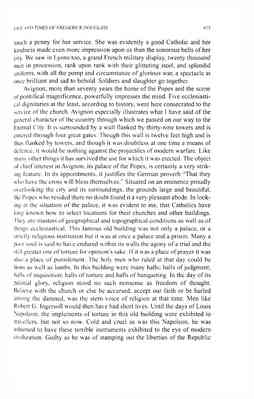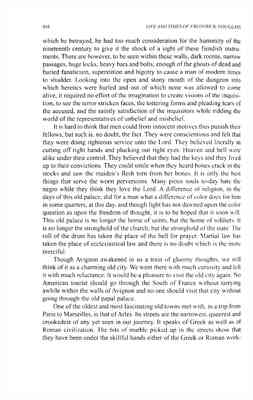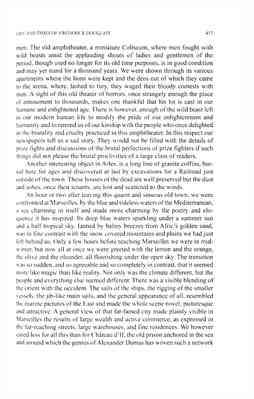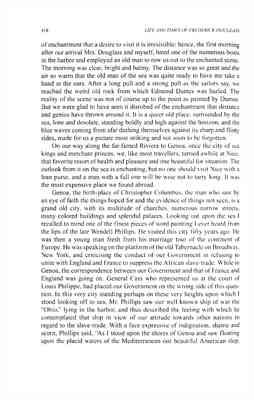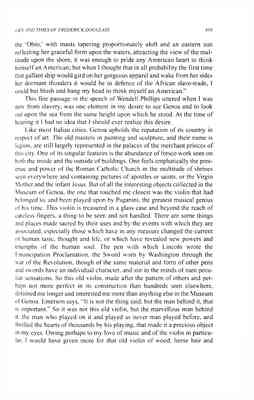Pages
41
LIFE AND TIMES OF FREDERICK DOUGLASS 415
touch a penny for her service. She was evidently a good Catholic and her kindness made even more impression upon us than the sonorous bells of her city. We saw in Lyons too, a grand French military display, twenty thousand men in procession, rank upon rank with their glittering steel, and splendid uniform, with all the pomp and circumstance of glorious war, a spectacle at once brilliant and sad to behold. Soldiers and slaughter go together.
Avignon, more than seventy years the home of the Popes and the scene of pontifical magnificence, powerfully impresses the mind. Five ecclesiastical dignitaries at the least, according to history, were here consecrated to the service of the church. Avignon especially illustrates what I have said of the general character of the country through which we passed on our way to the Eternal City. It is surrounded by a wall flanked by thirty-nine towers and is entered through four great gates. Though this wall is twelve feet high and is thus flanked by towers, and though it was doubtless at one time a means of defence, it would be nothing against the projectiles of modem warfare. Like many other things it has survived the use for which it was erected. The object of chief interest in Avignon, its palace of the Popes, is certainly a very striking feature. In its appointments, it justifies the German proverb "That they who have the cross will bless themselves." Situated on an eminence proudly overlooking the city and its surroundings, the grounds large and beautiful, the Popes who resided there no doubt found it a very pleasant abode. In looking at the situation of the palace, it was evident to me, that Catholics have long known how to select locations for their churches and other buildings. They are masters of geographical and topographical conditions as well as of things ecclesiastical. This famous old building was not only a palace, or a strictly religious institution but it was at once a palace and a prison. Many a poor soul is said to have endured within its walls the agony of a trial and the still greater one of torture for opinion's sake. If it was a place of prayer it was also a place of punishment. The holy men who ruled at that day could be lions as well as lambs. In this building were many halls: halls of judgment; halls of inquisition; halls of torture and halls of banqueting. In the day of its palatial glory, religion stood no such nonsense as freedom of thought. Believe with the church or else be accursed; accept our faith or be hurled among the damned, was the stern voice of religion at that time. Men like Robert G. Ingersoll would then have had short lives. Until the days of Louis Napoleon, the implements of torture in this old building were exhibited to travellers, but not so now. Cold and cruel as was this Napoleon, he was ashamed to have these terrible instruments exhibited to the eye of modem civilization. Guilty as he was of stamping out the liberties of the Republic
42
416 LIFE AND TIMES OF FREDERICK DOUGLASS
which he betrayed, he had too much consideration for the humanity of the nineteenth century to give it the shock of a sight of these fiendish instruments. There are however, to be seen within these walls, dark rooms, narrow passages, huge locks, heavy bars and bolts; enough of the ghosts of dead and buried fanaticism, superstition and bigotry to cause a man of modem times to shudder. Looking into the open and stony mouth of the dungeon into which heretics were hurled and out of which none was allowed to come alive, it required no effort of the imagination to create visions of the inquisition, to see the terror stricken faces, the tottering forms and pleading tears of the accused, and the saintly satisfaction of the inquisitors while ridding the world of the representatives of unbelief and misbelief.
It is hard to think that men could from innocent motives thus punish their fellows, but such is, no doubt, the fact. They were conscientious and felt that they were doing righteous service unto the Lord. They believed literally in cutting off right hands and plucking out right eyes. Heaven and hell were alike under their control. They believed that they had the keys and they lived up to their convictions. They could smile when they heard bones crack in the stocks and saw the maiden's flesh torn from her bones. It is only the best things that serve the worst perversions. Many pious souls to-day hate the negro while they think they love the Lord. A difference of religion, in the days of this old palace, did for a man what a difference of color does for him in some quarters, at this day, and though light has not dawned upon the color question as upon the freedom of thought, it is to be hoped that it soon will. This old palace is no longer the home of saints, but the home of soldiers. It is no longer the stronghold of the church, but the stronghold of the state. The roll of the drum has taken the place of the bell for prayer. Martial law has taken the place of ecclesiastical law and there is no doubt which is the more merciful.
Though Avignon awakened in us a train of gloomy thoughts. we still think of it as a charming old city. We went there with much curiosity and left it with much reluctance. It would be a pleasure to visit the old city again. No American tourist should go through the South of France without tarrying awhile within the walls of Avignon and no one should visit that city without going through the old papal palace.
One of the oldest and most fascinating old towns met with, in a trip from Paris to Marseilles, is that of Aries. Its streets are the narrowest, queerest and crookedest of any yet seen in our journey. It speaks of Greek as well as of Roman civilization. The bits of marble picked up in the streets show that they have been under the skillful hands either of the Greek or Roman work-
43
LIFE AND TIMES OF FREDERICK DOUGLASS 417
men . The old amphitheater, a miniature Coliseum, where men fought with wild beasts amid the applauding shouts of ladies and gentlemen of the period, though used no longer for its old time purposes, is in good condition and may yet stand for a thousand years. We were shown through its various apartments where the lions were kept and the dens out of which they came to the arena, where, lashed to fury, they waged their bloody contests with men. A sight of this old theater of horrors, once strangely enough the place of amusement to thousands, makes one thankful that his lot is cast in our humane and enlightened age. There is however, enough of the wild beast left in our modern human life to modify the pride of our enlightenment and humanity and to remind us ofour kinship with the people who once delighted in the brutality and cruelty practiced in this amphitheater. In this respect our newspapers tell us a sad story. They would not be filled with the details of prize fights and discussions of the brutal perfections of prize fighters if such things did not please the brutal proclivities of a large class of readers.
Another interesting object in Aries, is a long line of granite coffins, buried here for ages and discovered at last by excavations for a Railroad just outside of the town. These houses of the dead are well preserved but the dust and ashes, once their tenants, are lost and scattered to the winds.
An hour or two after leaving this quaint and sinuous old town, we were confronted at Marseilles. by the blue and tideless waters of the Mediterranean, a sea charming in itself and made more charming by the poetry and eloquence it has inspired Its deep blue waters sparkling under a summer sun and a half tropical sky, fanned by balmy breezes from Africa golden sand, was in fine contrast with the snow covered mountains and plains we had just left hehind us. Only a few hours before reaching Marseilles we were in midwinter, but now all at once we were greeted with the lemon and the orange, the olive and the oleander, all flourishing under the open sky. The transition was so sudden, and so agreeable and so completely in contrast, that it seemed more like magic than like reality. Not only was the climate different, but the people and everything else seemed different. There was a visible blending of the orient with the occident. The sails of the ships, the rigging of the smaller vessels, the jib-like main sails, and the general appearance of all, resembled the marine pictures of the East and made the whole scene novel, picturesque and attractive. A general view of that far-famed city made plainly visible in Marseilles the results of large wealth and active commerce, as expressed in the far-reaching streets, large warehouses, and fine residences. We however cared less for all this than for Chateau d'If, the old prison anchored in the sea and around which the genius of Alexander Dumas has woven such a network
44
418 LIFE AND TIMES OF FREDERICK DOUGLASS
of enchantment that a desire to visit it is irresistible; hence, the first morning after our arrival Mrs. Douglass and myself, hired one of the numerous boats in the harbor and employed an old man to row us out to the enchanted scene. The morning was clear, bright and balmy. The distance was so great and the air so warm that the old man of the sea was quite ready to have me take a hand at the oars. After a long pull and a strong pull as the sailors say, we reached the weird old rock from which Edmond Dantes was hurled. The reality of the scene was not of course up to the point as painted by Dumas. But we were glad to have seen it disrobed of the enchantment that distance and genius have thrown around it. It is a queer old place, surrounded by the sea, lone and desolate, standing boldly and high against the horizon, and the blue waves coming from afar dashing themselves against its sharp and flinty sides, made for us a picture most striking and not soon to be forgotten.
On our way along the far-famed Riviera to Genoa, once the city of sea kings and merchant princes, we. like most travellers, tarried awhile at Nice, that favorite resort of health and pleasure and one beautiful for situation. The outlook from it on the sea is enchanting, but no one should visit Nice with a lean purse, and a man with a full one will be wise not to tarry long. It was the most expensive place we found abroad.
Genoa, the birth-place of Christopher Columbus, the man who saw by an eye of faith the things hoped for and the evidence of things not seen, is a grand old city, with its multitude of churches, numerous narrow streets, many colored buildings and splendid palaces. Looking out upon the sea I recalled to mind one of the finest pieces of word painting I ever heard from the lips of the late Wendell Phillips. He visited this city fifty years ago. He was then a young man fresh from his marriage tour of the continent of Europe. He was speaking on the platform of the old Tabernacle on Broadway, New York, and criticising the conduct of our Government in refusing to unite with England and France to suppress the African slave-trade. While in Genoa, the correspondence between our Government and that of France and England was going on. General Cass who represented us at the court of Louis Philippe, had placed our Government on the wrong side of this question. In this very city standing perhaps on these very heights upon which l stood looking off to sea, Mr. Phillips saw our well known ship of war the "Ohio," lying in the harbor, and thus described the feeling with which he contemplated that ship in view of our attitude towards other nations in regard to the slave-trade. With a face expressive of indignation, shame and scorn, Phillips said, "As I stood upon the shores of Genoa and saw floating upon the placid waters of the Mediterranean our beautiful American ship,
45
LIFE AND TIMES OF FREDERICK DOUGLASS 419
the 'Ohio,' with masts tapering proportionately aloft and an eastern sun reflecting her graceful form upon the waters, attracting the view of the multitude upon the shore, it was enough to pride any American heart to think himself an American; but when I thought that in all probability the first time that gallant ship would gird on her gorgeous apparel and wake from her sides her dormant thunders it would be in defence of the African slave-trade, I could but blush and hang my head to think myself an American."
This fine passage in the speech of Wendell Phillips uttered when I was new from slavery, was one element in my desire to see Genoa and to look out upon the sea from the same height upon which he stood. At the time of hearing it I had no idea that I should ever realize this desire.
Like most Italian cities, Genoa upholds the reputation of its country in respect of art. The old masters in painting and sculpture, and their name is legion, are still largely represented in the palaces of the merchant princes of this city. One of its singular features is the abundance of fresco work seen on both the inside and the outside of buildings. One feels emphatically the presence and power of the Roman Catholic Church in the multitude of shrines seen everywhere and containing pictures of apostles or saints, or the Virgin Mother and the infant Jesus. But of all the interesting objects collected in the Museum of Genoa, the one that touched me closest was the violin that had belonged to, and been played upon by Paganini, the greatest musical genius of his time. This violin is treasured in a glass case and beyond the reach of careless fingers. a thing to be seen and not handled. There are some things and places made sacred by their uses and by the events with which they are associated, especially those which have in any measure changed the current of human taste, thought and life, or which have revealed new powers and triumphs of the human soul. The pen with which Lincoln wrote the Emancipation Proclamation, the Sword worn by Washington through the war of the Revolution, though of the same material and form of other pens and swords have an individual character, and stir in the minds of men peculiar sensations. So this old violin, made after the pattern of others and perhaps not more perfect in its construction than hundreds seen elsewhere, detained me longer and interested me more than anything else in the Museum of Genoa. Emerson says, "It is not the thing said, but the man behind it, that is important." So it was not this old violin, but the marvellous man behind it, the man who played on it and played as never man played before, and thrilled the hearts of thousands by his playing, that made it a precious object in my eyes. Owing perhaps to my love of music and of the violin in particular, I would have given more for that old violin of wood, horse hair and
